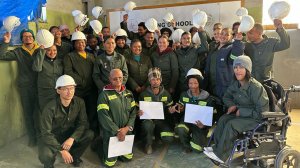JOHANNESBURG (miningweekly.com) – Copper 360’s mining school in the Northern Cape is attracting attention from international mining schools and global agencies wanting to partner with it.
“We’ve received a lot of requests,” Copper 360 executive director: human capital development Quinton Adams told Mining Weekly in a Zoom interview. (Also watch attached Creamer Media video.)
JSE AltX-listed Copper 360, headed by CEO Jan Nelson and chaired by Shirley Hayes, is intent on not only catering for the skills needed for its own mining and processing but also the needs of the Namaqualand area, where there are close to half a dozen mines.
In addition, a strategic partnership with Sol Plaatje University of Kimberley is envisaged, talks have begun with the Camborne School of Mining of the UK, a mining school in Poland made contact last week, and requests are being received from African countries regarding involvement with what will serve as an incubation centre for mining-related skills, amid the wave of mining growth sweeping through the Northern Cape.
Facilitators training the 30 students are working according to the Vygotsky theories of zone of proximal development to ‘scaffold’ these students towards the required levels of skill.
“What I like most about these facilitators – and they are stunning, and very dynamic – are their personal stories, their own journeys that they are sharing with the students, to broaden their perspectives and horizons,” said Adams.
The students are learning about mining in a mining environment. When they open their doors after receiving theoretical instruction, they see that theory being carried out in practice.
“It is theory combined with practical. We take them from the bottom and we move them up,” said Adams.
The three non-accredited courses that have been offered thus far are on basic geology and sampling and the development of ore reserve technicians. Simultaneously, future jobs that will be done at the copper operation are being mapped.
The flotation plant being built requires a higher level of skills, for which non-accredited courses are being developed.
“We want to be the leading mining school in the Northern Cape and to build partnerships with Sol Plaatje University, other mines, and, very importantly, the education department so that young people who are living in the area can become part of mining development,” said Adams.
To what extent will students obtain modern exposure to exploration, resource development, copper mining and copper beneficiation?
The ‘scaffolding’ approach is being used as a core fundamental principle. We start at the bottom and we ‘scaffold’ students through all these different programmes. The last programme will be introduction into mining law, drone technology and surveying. After that, we’ll start to focus next year on underground geology. A very interesting aspect is the digital skills that students are lacking. Before we can talk about artificial intelligence and mine optimisation, we first have to start at the bottom and that's why we are working with the schools because robotics and artificial intelligence need to start at an early age and that is the long-term plan to take students from the bottom and develop them to where they can understand and partake in beneficiation and exploration techniques.
More than 200 curriculum vitae were received for the initial 30 places, which is an indication of the eagerness of the people of the area to be trained.
EMAIL THIS ARTICLE SAVE THIS ARTICLE ARTICLE ENQUIRY
To subscribe email subscriptions@creamermedia.co.za or click here
To advertise email advertising@creamermedia.co.za or click here










